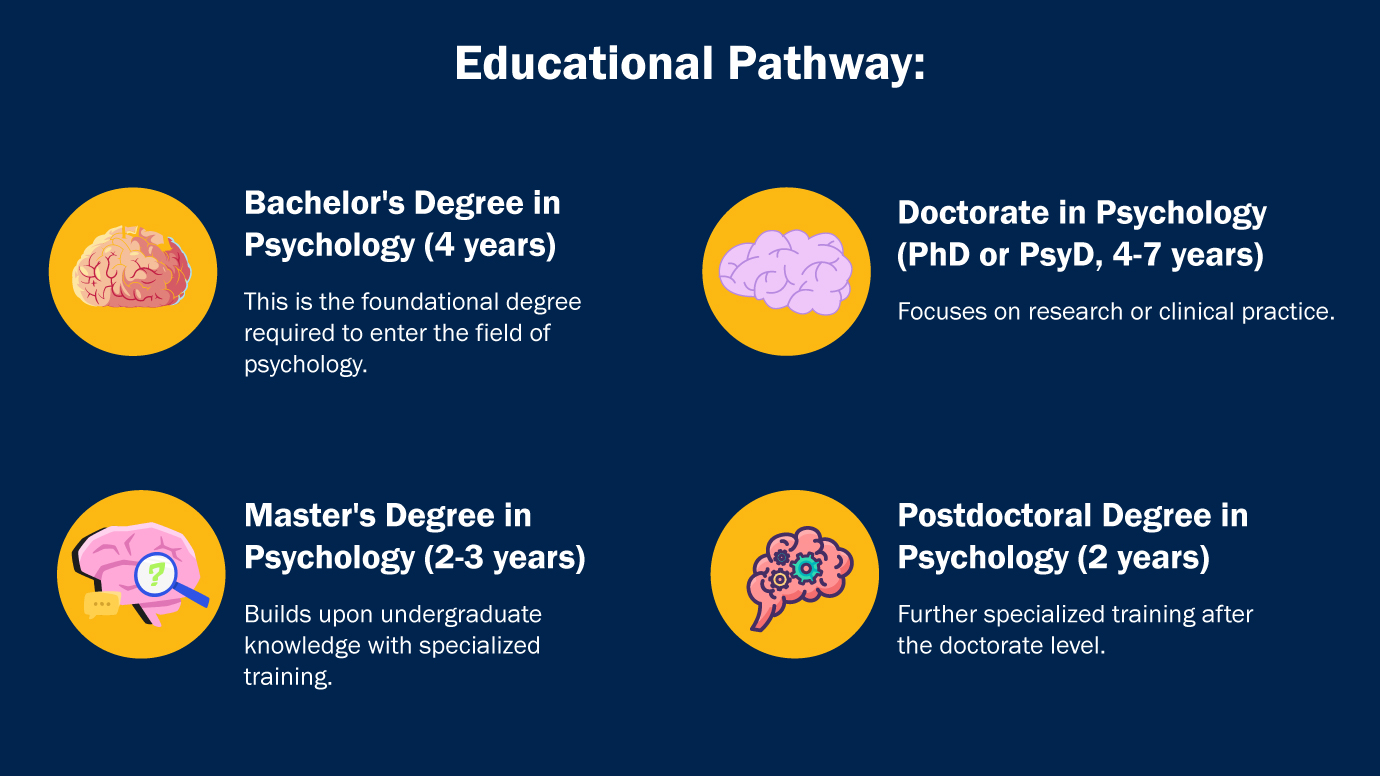Different Types of Psychology Degrees and the Jobs Within Psychology
Friday, January 3, 2025

A wide range of diverse career prospects are opened by a psychology degree, including mental health counseling and organizational leadership. This guide reviews the different types of psychology degrees, how long it takes to earn them, and the careers they prepare you for. Also, see how the SNHU Master of Science in Psychology can benefit you in this discipline's career path.
Different Psychology Degrees and Where They Can Take You
Psychology is an impressive field, covering many aspects of human behavior, mental development, and social activities. Psychology experts are needed in fields ranging from healthcare and education to business and criminal justice. Whether you want to advise the next generation, act as an intermediary between employees and employers, or make feel-changing discoveries in our minds, the best psychology degree you select could very well be able to do it all.
In this blog, we will cover the following key topics:
• The different types of psychology degrees.
• Duration of psychology degrees.
• What careers a psychology degree lead to.
Also, if you want to transition into a psychology career then look out for a master's in psychology and a BA in psychology course from a U.S.-accredited university.
How Many Years Will It Take to Become a Psychologist?
The time required to become a psychologist depends on your desired role and the level of education necessary to achieve it. Typically, the first step is to obtain a bachelor’s degree in psychology, which takes about four years. This step involves the basic theories of psychology, research methodologies, and human behavior. After that, some students start working in entry-level positions, while some continue their studies.
A master’s degree in psychology, which typically takes two to three more years, prepares people for specialized jobs such as school counselors or industrial-organizational psychologists. The theoretical knowledge along with practical expertise at this stage, is received through internships and sometimes a thesis.
The path to pursuing clinical or research-oriented careers requires a doctorate (PhD or PsyD), which adds another four to seven years of post-graduate coursework.
This stage entails challenging classes, independent studies, clinical work, and dissertation work. Graduates aspiring to licensure typically complete one to two years of supervised postdoctoral training and take licensure examinations (e.g., EPPP).
Time frames depend on specialization and career aspirations. For example, clinical psychologists might take 10–12 years to train, while school psychologists or industrial-organizational psychologists might skip the doctoral stage and finish in six to seven years.
Other considerations, such as whether a program offers part-time enrollment or an online option, or whether it’s research-intensive, can also affect your timeline.
Understanding the time commitment and planning your academic and professional path ensures that you can achieve your psychology career aspirations effectively.
Various Pathways of Psychology
● Associate Degree in Psychology
An associate degree in psychology is two years of education that gives a basis for understanding people and their thoughts and feelings. Graduates commonly seek psychiatric aides, case managers, or other beginner roles in Mental health treatment.
● Bachelor's in Psychology Degree
A bachelor's in psychology (BA in Psychology from SNHU) provides students with a solid foundation in psychology theories and research methodologies. There are many different career options with this degree such as human resources manager, marketing, and social services. It also acts as a foundation for higher studies.
● Master's Degree in Psychology
Most commonly, a master's in psychology (MS in Psychology) is available, with students able to focus on clinical, industrial-organizational, or forensic psychology, among other specializations. Applied in real-world scenarios such as designing interventions in workplaces, therapy, and research. The higher the level of education, the higher the pay grade and the leadership position.
● Doctorate in Psychology
Doctorate in psychology (PhD or PsyD): A doctorate in either philosophy or psychology is the highest academic degree in psychology, received either in frame or clinical research (or practice). Psychologists who hold a doctorate often serve as licensed therapists, university faculty, or organizational consultants.

Jobs aspects as per Knowledge
With a BA in Psychology from SNHU, graduates can pursue roles such as:
● Human Resource Specialist: A Human Resource Specialist uses psychology to maximize efficiency, morale, and job satisfaction amongst their team. These forms help in recruitment, training, and then in conflict resolution incorporating psychological principles ensuring the mental well-being of the employees along with their productivity.
● Market researcher: A Market Researcher uses psychology to unravel consumer behaviors and preferences. They explore attitudinal and motivational aspects of consumer culture, which facilitates the planning of successful marketing approaches.
● Behavioral technician: Brought about techniques from the field of psychology that include implementing plans for behavior intervention for people whose behavior is challenging. They assist with progress tracking and documentation, skill acquisition, and ensuring the service delivery is effective under the supervision of a Board-Certified Behavior Analyst (BCBA).
The online degree programs from SNHU leverage psychological knowledge to address practical problems in businesses and social services.
An MS in Psychology leads to more specialized occupations such as:
● Industrial-organizational psychologists: They research employee behaviors, create training programs, and design plans to foster a more positive culture within an organization. They study how people behave in professional environments, helping create well-oiled, motivating workplaces that tie employee satisfaction to the success of the business.
● Clinical therapist: A Clinical Therapist uses psychological techniques to ameliorate mental health problems. They provide therapeutic support to individuals, groups, and families, focusing on emotional, psychological, and behavioral issues.
● Research Analyst: A Research Analyst applies their psychological knowledge to observe data and deliver useful business information. They engage in trend analyses, survey the market, and assess the effectiveness of business strategies.
How SNHU’s MS in Psychology Helps Build These Skills
SNHU’s Master of Science in Psychology program prepares students with advanced skills in analysis, research, and application. The coursework links theory with practical settings and encourages students to pursue degrees in organizations and systems, mental health applications, or forensic psychology. SNHU gained the flexibility of an online degree from the U.S. for working professionals to study abroad online, along with hands-on practical experience through case studies and applied projects.
